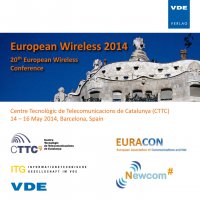Impact of AC Coupling on Zero-IF Architectures for Wide-Band Millimeter-Wave Gigabit Transmitters
Konferenz: European Wireless 2014 - 20th European Wireless Conference
14.05.2014 - 16.05.2014 in Barcelona, Spain
Tagungsband: European Wireless 2014
Seiten: 6Sprache: EnglischTyp: PDF
Persönliche VDE-Mitglieder erhalten auf diesen Artikel 10% Rabatt
Autoren:
Rezola, Ainhoa; del Rio, David; Sevillano, Juan F.; Berenguer, Roc; Velez, Igone (Electronics and Communications Department, Centro de Estudios e Investigaciones Tecnicas (CEIT), 20018 San Sebastian, Spain)
Rezola, Ainhoa; del Rio, David; Sevillano, Juan F.; Berenguer, Roc; Velez, Igone (Electrical, Electronic and Control Engineering Department, Technological Campus of University of Navarra (TECNUN), 20018 San Sebastian, SPAIN)
Leyh, Martin (Fraunhofer Institute for Integrated Circuits (IIS), D-91058 Erlangen, Germany)
Inhalt:
This paper considers the design of a transceiver able to provide a data rate of 10Gbps for the backhaul of the future mobile network. The paper describes a zero-IF architecture to support 64-QAM and a bandwidth of 2GHz in E-Band. Zero-IF architectures present several impairments that corrupt the information bearing base-band signal around DC. The paper reviews these issues paying special attention to the AC couplings in the transceiver analog chain. This RF impairment is modelled at system level and its impact on transceiver performance is evaluated. The results presented in the paper highlight the importance of this RF impairment for high-order modulation. It is shown that the destruction of more than 0.01% of the signal in 64-QAM can yield an important loss in performance.


